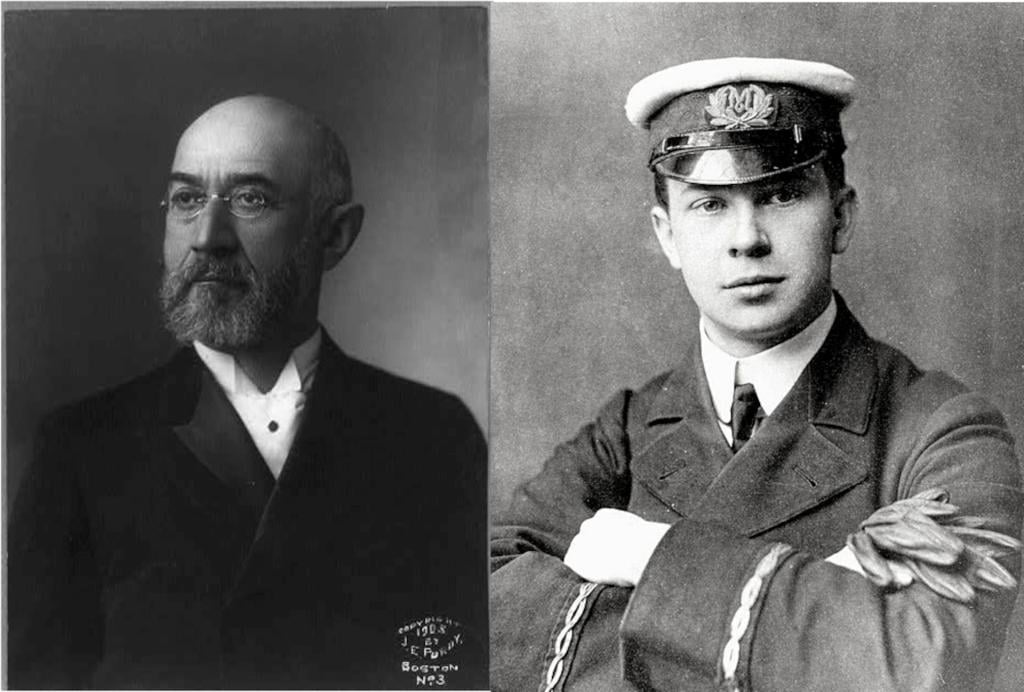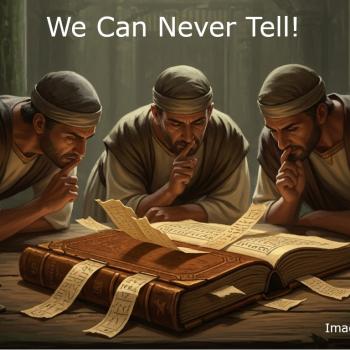Are we saints in our own eyes?
The answer makes a lot of difference in our lives. People who think of themselves as “bad,” often get worse. People who think of themselves as “good,” often become even better. In fact, a negative self-image is not only toxic, it also warps our image of others. So we have to ask, “Is telling people they are “sinners,” a worthwhile thing? I say there are better ways.
Are there other considerations, such as the lack of wealth? Candidly, yes.
Sometimes we need a reminder that even though we are saints in our own eyes, we still fall short of the glory of God. None of us are perfect. But we’re forgiven and can move on without destructive guilt. Recognition of our shortcomings and guilt are two different things.
Podcast show links with added content: Substack, YouTube video, Spotify, and Apple podcasts. These appear a day after blog-article posts.

Examining human nature
The wreck of the Titanic, caused by striking an iceberg, gives us a peek into human nature.
Jack Phillips, the Titanic’s wireless operator, a man from a meager background in the UK, worked tirelessly sending SOS signals to nearby ships, even as the ship began to sink. He continued sending signals until the very end.
Fr. Thomas Byles: A Catholic priest, refused a lifeboat to remain on the ship and provided spiritual comfort to others.
Pastor John Harper: A Scottish Evangelical pastor, helped his six-year-old daughter into a lifeboat and then chose to stay on the ship to offer words of encouragement and give his life jacket to someone in need.
Isidor Straus: A prominent businessman and co-owner of Macy’s, famously stayed on the ship with his wife, refusing to board a lifeboat and allowing women and children to get on first.
Rich and poor, religious and maybe not so, not one who was perfect, gave up their lives so that others would live. Did they view themselves as good or bad? Would it have made any difference? Well, on the Titanic, there were crew members who surreptitiously entered the wireless room to steal their flotation devices. How did these “bad” men view themselves?
Human nature varies. Some are brave. Some do any cruel act for self-preservation. Most of us don’t want that trial—I sure don’t. Can we view ourselves as good or bad depending on what we might do? Or does the way we view ourselves determine what we’re willing to do to others?
Accompanying song by Dorian: song on YouTube.
How does God view us?
Do we think God sees us as kicked out of God’s good graces? Kicked out! Condemned? Or does God see us as worth Jesus’ sacrifice for us. People worth fighting for. Rather than a binary choice, is there a middle ground where God favors us and wants us to overcome and do well, without guilt destroying us?
Jesus’ sacrifice says it all. We are the apple of God’s eye. God wants us.
The horror of some Christianity
Jesus freed us of this negative self-image and the idea that we are eternally condemned. We can be forgiven if we just ask. We also have to make it right with those we’ve harmed.
The idea of original sin
Much of current Christianity offers one central interpretation of the Adam and Eve story. “We’re all doomed, I tell you, doomed I say! The original sins of Adam condemn us all. We’re rotten to the core. Only sacrifice will save us!”
Bah, humbug, I tell you!
Would it surprise you to know that Judaism, the preservers of the Adam and Eve story in their Hebrew Bible, doesn’t regard Adam and Eve as sinful. It regards them as trying to help God. It regards them pragmatically as doing a good thing by acquiring knowledge.
The Samaritans, who are keepers of the first five books of the Bible, see the Adam and Eve story as a foundational narrative for understanding human nature, the relationship between humanity and God, and the concept of sin and redemption.
What is it really about? The Adam and Eve story in the Bible is about disobedience and fall from God’s good graces into a world of suffering. At least that’s what we focus on. Suffering grabs our attention. Yet the story is about eating from the tree of the knowledge of good and evil, and the repercussions. God cursed the ground for their disobedience, not Adam and Eve, so that work would be difficult. Paradise lost, not people lost.
What were the ancients trying to tell us? That people are bad? Disobedient? This was some reason for suffering.
Cursing of the ground is the ancients telling us about the reality of work and suffering. In that comes the knowledge of good and evil.
As stories go, eating the forbidden fruit was a major turning point from innocence and paradise to the theme of suffering because we are no longer innocent. The ancients were telling us that people are endlessly hungry for knowledge, and will experiment, disobey, and in all other ways use the inquisitive brain that God gave us to seek knowledge? God created us to be inquisitive, to want to learn and to grow. That’s not a bad thing.
The simple fact is, to learn about good and evil means walking a treacherous road full of bad actors, temptations, illusions, and other traps. We learn through experience. It entails suffering. But we choose this path again and again. We experiment. We explore. We even disobey. We fall. And we pick ourselves up and do it again.
There are many parallel creation stories of an original paradise from antiquity. Worldwide Traditions of Primordial Paradise. One parallel story in ancient history, the Pandora story of the famous Pandora’s box unleashing evil on the world, is the result of her “gift” of insatiable curiosity. Eve, Pandora and Plato: How Greek Myth Shaped the First Christian Woman.
This presents another interpretation of the story such that in the Garden, mankind had no free will, no independence, and no knowledge. It is only after they eat from the Tree of Knowledge of good and evil that Adam and Eve are truly “in God’s image.”
The focus on sin
Did Christianity get the interpretation wrong, while Judaism got it right? Is there a middle ground?
The focus on sin creeps into Christian theology like a serpent. Christ died to get rid of this focus and turn the focus on love. But we drag it back in.
Why do we condemn ourselves?
Science explains that we are hardwired to look for danger. If it can harm us, we focus on it. We celebrate it in stories of scandal, murder, theft, etc. Danger holds an outsized place in our lives. It draws us in. If we see it in others, we condemn it before it can get to us.
The destructive power of sin is brought back into our lives through this focus. We give it an oversized place. It occupies too large a place in our heads. It makes us afraid and suspicious of everyone. It is an obstacle to relationships.
The less we know about each other, the more suspicious we are. When we get to know each other, suspicion falls away and we become friends.
The idea that we are all condemned drives the idea that we are all bad people, and bad people can hurt us, and this drives us to stay apart from each other.
Science doesn’t understand good and evil
Science explores but doesn’t understand. We know that most of us want to contribute in some way to society, not just take as much as we can without giving back. Around half of us donate to charity, and among the affluent it’s 85%. In religious institutions, giving ranges from five to ten percent of individual income, reflecting how people are “prospered.”
But science always looks for a selfish or self-oriented reason for this. Altruism, they claim, is driven by selfish desires. I guess this explains why people gave up their seats and went down with the Titanic? I don’t buy it. We all have a spiritual connection, which is a little piece of God in us. And we have compassion for others that motivates us.
Some blame selfishness on the popular concept of “The Lizard Brain.” Psychotherapist Ana Lund, in her article, Goodbye Lizard Brain, explains this is a major misconception. As a source of selfishness, it’s wrong.
Additional resource: Healthy Selfishness and Pathological Altruism: Measuring Two Paradoxical Forms of Selfishness.
Psychologist Abigail Marsh, in her TED Talk, Why some people are more altruistic than others, shows scientific evidence that psychopaths have a marginally smaller Amygdala (portion of brain), while those who are known for extreme altruism have a marginally larger one. Fascinating stuff.
I fell out of my crib and landed on my head so many times my uncle said if I lived, I’d be a genius. I guess it didn’t damage my amygdala.
More importantly, Abigail Marsh found that people who are extremely altruistic have a much smaller sense of their own importance. They are humble.
Humble. Humility.
Jesus was humble. How could someone who represents God be humble?
It’s not that we are good, bad, rich, poor, although there are influences from nature, nurture, and our experience. It’s that we are to approach life with humility. We should not think we are more than we are. And we certainly don’t think we are less than we are. The universe doesn’t rotate around us, we aren’t due anything from anyone. We should think of ourselves as humble.
Use Jesus as the example. Jesus presented himself with humility. He is Son of God, yet he was the suffering servant who washed the feet of others, and gave his life for others so they could have a better life.
Examining versus condemning
There is a major difference between monitoring our behavior and trying to do better, compared to being critical of ourselves.
Look for the good in others and we’ll find more good in ourselves because when we can overlook the downsides of others, we can overlook it without condemning ourselves.
We don’t like looking at ourselves, even without judgment. The Greek philosopher Socrates was a major proponent of thoroughly examining our lives and what we believe. He gave us the Socratic Method of critical thinking.
Some hated him. For his efforts, they forced him to commit suicide. He said at his trial for impiety (lacking proper respect for the sacred) and corrupting youth. How did he corrupt them? By questioning and critical examination of Athenian leaders and traditions, exposing perceived contradictions in their reasoning, leading to a perceived erosion of respect for authority and established beliefs. He challenged the status quo. “The unexamined life is not worth living.”
I guess you have to blame youth’s lack of respect for authority and questioning beliefs on someone. LOL!
What about Jesus? He said the leaders were snakes. If we criticize leaders, will we get blacklisted? It cost Socrates and Jesus their lives. Yet this is what youthful people do. They question. They examine. They critique.
We should examine ourselves and critique. But not create guilt and condemn.
What focusing on the negative does for you
Mental Health:
- Depression and Anxiety: Low self-esteem is strongly linked to increased risk of developing depression, anxiety, and other mental health conditions.
- Suicidal Thoughts: In severe cases, low self-esteem can contribute to suicidal ideation.
- Negative Self-Talk and Perfectionism: Individuals with low self-esteem may constantly criticize themselves, focusing on their flaws and fearing failure, leading to perfectionism and a negative outlook.
Relationships:
Low self-esteem can make it challenging to trust others, seek intimacy, and develop healthy relationships.
Those with low self-esteem may struggle with excessive jealousy, insecurity, and a constant need for reassurance in their relationships.
Relationship problems can arise from poor communication, difficulty expressing needs, and an inability to resolve conflicts constructively.
Personal and Professional Life:
- Poor Performance at School or Work:
Low self-esteem can hinder academic achievement, job performance, and overall motivation.
- Avoiding Challenges and Taking Risks:
Fear of failure and self-doubt can lead to avoidance of new experiences and a reluctance to take risks.
Some individuals may turn to substances or other unhealthy behaviors to cope with low self-esteem.
Social and Behavioral Issues:
Individuals may withdraw from social situations due to fear of judgment or rejection.
In some cases, low self-esteem can manifest as bullying or aggressive behaviors to compensate for feelings of inadequacy.
In severe cases, low self-esteem may lead to self-harming behaviors like cutting or self-inflicted injury.
Telling people how “sinful” they are works wonders. But not the kind you want to produce.
Jesus said, “Why do you look at the speck that is in your brother’s eye, but do not notice the log that is in your own eye?” – Matthew 7:3.
A daily prayer for growth
God Help Me Become
Copyright © 2025 by Dorian Scott Cole, Mechanical Rights Reserved. (You can’t record this and sell it as your own, in any version or any media without permission from me.)
This poem is now a song on YouTube.
Permission granted for the poem and song to be used in religious or spiritual services with credit to the author.
God help me become
Better each day,
Treat others as myself,
in the very same way.
Help me see needs
And help if I can.
Help me know when
Help is only a scam.
Help me not tread on
The hearts of others,
Because I can’t see,
The pain in my brothers.
[chorus]
In this way may I
God’s love reflect.
That others may then,
God’s love detect.
Help me respect all.
Ignore faults I see.
Find good in others,
Like I see in me.
Help me make right
With any I’ve hurt.
Judge myself first,
Not others as dirt.
Help me see my faults
And eliminate them,
Knowing you forgive,
While becoming a gem.
[chorus]
In this way may I
God’s love reflect.
So others may then,
God’s love detect.
Conclusion
Human nature is not so simple as good or evil. We all have that self-preservation side that is difficult to override. We all have compassion for others. It’s not always easy to share with others. While poor people have been found in studies to be very helpful to others, having little money can be an obstacle to giving. I think Jesus recognized this in his saying, treat others as you would yourself. In that he didn’t ask us to neglect ourselves. He just ask us to treat others as well as we do ourselves. It’s on the path to becoming better people in the domain (Kingdom) of God.
The path to destruction is a simple one. You pick up your Bible, slam it on the pulpit, scream people are condemned and fan the flames of some Hell you think they deserve for something that seems like a sin to you, because you disobey scripture and judge others.
You stay away from them because they’re evil and might corrupt the faithful. You forsake your God given mission to show them the love of God. So you stand in for Satan, the accuser, who Jesus took the power away from through forgiveness. Make them feel bad about themselves so they go away and get worse, and their relationships are ruined. Drag them down into sin and darkness and despair where they feel trapped. Who is it that is condemned?
Instead, show them something positive they want to become. Attract them with love. Jesus is our example and He attracted the masses of people, and said he didn’t come to condemn anyone.
Even for Jews with their strict laws, Jesus consistently approached sinners with compassion, grace, and a willingness to forgive, rather than condemnation. He often associated with them, showing them that they mattered and that they belonged, even though they had made mistakes. Jesus’s interactions with sinners, such as the sinful woman at the well, the woman caught in adultery, and his eating with tax collectors and sinners, demonstrated his love and willingness to offer forgiveness. Sin and the sinner were separate. All were worthy of God’s love. At most he said, “Go and sin no more.”
We should be very careful. Jesus was more critical of the Pharisees and self-righteous religious leaders who condemned others while failing to recognize their own sin. That would be us.
If you are showing others the love of God, you don’t have time to condemn them or think about their sins. If you’re evaluating your own behavior and correcting it, you don’t have time to evaluate others.
We can lift people from the quagmire of bad relationships and doing things that hurt others. We can show them the better way without destroying them.
“With hate, we have more to lose than gain – break the cycle” – Dorian Scott Cole
Probability Space
What probability spaces can we open in our minds to demonstrate the love of God and our own love of others, to help the world be a better place for all, so that people want to follow the Way Jesus showed us to live?
(A probability space is where all of the elements necessary for something to happen are present and it’s almost inevitable. All it takes is intention.)
Potential Space
If you think creatively and allow your mind to wander and explore, how can we help others understand that they are not bad people, although they may have done some hurtful things, and that God loves them?
Would love to hear your thoughts in the comments below. This helps me improve my work.
Please subscribe to my Patheos Newsletter.
Below is information for church planning to minister to new generations, building a community of action, service opportunities, education opportunities for new generations, and descriptions of the author’s nonfiction books.
Some things that you might love
Would love to hear your thoughts in the comments below. This helps me improve my work.
Please subscribe to my Patheos Newsletter.
Below is information for creating change in my new book, Unleash Movements that Matter: Break Through Barriers to Change.
My new book. Unleash Movements that Matter: Break Through Barriers to Change.
My new book, Unleash Movements that Matter: Break Through Barriers to Change, which I wrote for new generations, I research and explain in great detail what it takes to create change in our world. (An audio presentation is in progress.)
Ministering to New Generations – strong impact course
How can churches minister to new generations if they won’t come to church? The church has been losing people at 1% a year, and now most of new generations won’t come.
I developed and presented a course on understanding and working with new generations. I would like to say I had rave reviews, but on a scale of 1 to 5 it averaged 4.5. Well, some people were raving.
The course helps people understand new generations, their values, and their differences. It helps people understand how to build a bridge to them and minister to them. The old worn-out things we used to do don’t work, and for good reason. This solutions focused course enables people to find new ways, appropriate ways, to minister to these generations in their local circumstances. It’s for church groups and generates deep discussion.
Free video preview of the course
Course on Udemy: Understanding and Working with New Generations
________________________
– Dorian
Our answer is God. God’s answer is us. Together, we make the world better.
Restore and recreate. Take time to celebrate life. Laugh, sing, and dance regularly, even every day. Happy. This is why we dance to celebrate life: Reindeer actually running and dancing.
Building a Community of Action
New Way Forward community
Can we make positive change in our world and end a lot of suffering?
Helen Keller, who was both blind and deaf, said: “Although the world is full of suffering, it’s also full of the overcoming of it.”
The human spirit yearns for a world without suffering, but it’s through facing challenges that we progress. The world isn’t perfect, but together we can create a future with less hardship. Famine, discrimination, gun violence, and injurious economic and educational disparities are complex problems, yet understanding their root causes empowers us to find solutions.
Launching in first quarter 2025, the New Way Forward community will connect individuals seeking practical solutions and creating lasting change. We’ll focus on understanding problems and their solutions, and how to effectively create change.
Join us in building a brighter tomorrow! New Way Forward on Facebook.
Civic service opportunities
Do Unto Others Kindness Campaign, and civic engagement.
United Methodist Church Volunteer Opportunities.
Join or support Zero Hour and amplify the voices of youth organizing for climate action.
Peoples Hub. Resistance, Resilience, Restoration, Re-imagination. Online Popular Education. For movement workers to learn, connect, collaborate, and strategize – in and across the disability justice and solidarity economy movements.
Stakeholder Capitalism – a video podcast series from the World Economic Forum. Can capitalism be made to work for all of us – and to improve rather than destroy the state of the planet?
General service and aid opportunities (on One Spirit Resources Website). To add your service opportunity to the One Spirit Resources list, contact the author (me) through Facebook Messenger. Note that I only friend people I know.
————————————–
Education Opportunities for New Generations
Becoming an Entrepreneur – MITx online
Evaluating Social Programs – MITx online
_______________________
Bible scripture verses are New American Standard Version (NASB), unless noted.
_______________________
Author and books
New Generations Walk with Jesus: Newer generations feel unloved, alone, lost, stressed, and are searching for a deeper spiritual connection that they don’t find in the church. This book draws on fifty years of the author’s quest to understand people, religion, and spirituality, and his work with many denominations. It provides a deep analysis of pressing questions these generations have, without denominational baggage.
Appease the Volcano: What does God require from people? The voices of the ancients from many religions echo much of the same things: It starts with law, then mercy and forgiveness, then love. Love is a major emphasis in all major religions and replaces law.
The Prophetic Pattern: Ancient and Modern Prophecy: How to distinguish the intent of various types of prophecies and oracles, both ancient and modern.
Preparing For the Future Of Work and Education: Analysis of the kinds of jobs that AI and Robotics will displace, and the educational requirements for them. AI will replace or augment thirty percent of jobs. This is an in-depth analysis citing many authoritative sources.
Author Website: Dorian Scott Cole













